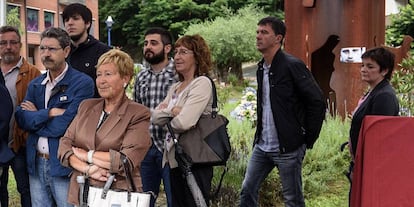In a first, Basque party linked to ETA attends tribute to famous victim
Miguel Ángel Blanco was kidnapped and murdered 19 years ago, and his assassination marked a turning point in the fight against terrorism


In a historic first, representatives of the Basque radical pro-independence party EH Bildu attended the annual commemoration of a Popular Party (PP) councilor, Miguel Ángel Blanco, who was kidnapped and murdered by ETA 19 years ago.
EH Bildu, which includes former members of Batasuna – considered the political wing of ETA before it was banned – sent two senior figures from the party, along with local councilors, to the event in the small town of Ermua, in Bizkaia, where Blanco had been a councilor himself.
The kidnapping and assassination on July 13, 1997 of Blanco, who was 29 at the time, made headlines around the world and galvanized Basque society into more openly rejecting ETA’s terrorism, which killed more than 800 people and left many thousands more injured. Opinion surveys showed social support for ETA falling from 20% in 1995 to 3% in 2007.
Wednesday’s commemorative event, organized by Ermua’s local council, which is run by the Socialist Party (PSOE), was attended by representatives of the main political parties in the town. But until now, EH Bildu’s councilors had abstained from the annual homage. This year also paid tribute to Sotero Mazos, who was murdered by ETA in Eibar in 1980.
Blanco’s death marked a turning point: within a decade, ETA’s ability to carry out deadly attacks had been severely reduced, in part due to cooperation with the French police, and a halting peace process had begun
Members of EH Bildu, which enjoys around 25% support in the Basque Country, have taken part in a number of commemorations of the victims of terrorism over the last two years. But those events were for “all the victims” of violence in the Basque Country, including suspects who died in police custody and those killed by the GAL vigilantes who targeted ETA members in the 1980s. The GAL death squad is believed to be responsible for 27 murders.
In many ways, Blanco’s death marked a turning point: within a decade, ETA’s ability to carry out deadly attacks had been severely reduced, in part due to cooperation with the French police, and a halting peace process had begun that saw ETA declare a number of ceasefires until it announced it was definitively laying down its arms in October 2011.
Wednesday’s tribute brought together senior figures from across the political spectrum, as well as the heads of a number of organizations representing the victims of terrorism. A plaque was unveiled in memory of both Blanco and Mazos.
Addressing the crowd, Carlos Totorica, the mayor of Ermua, said that for four decades, the Basque Country had suffered from a “parallel state” where anybody who publicly said they did not support Basque nationalism was “threatened in public, and their names posted on bulls-eyes on the walls of their communities” and printed in pro-independence newspapers with ties to ETA.
“This was a parallel state made up not just of ETA, but also Batasuna and other organizations and associations that monitored everybody and brooked no dissent. A parallel state that for more than 40 years gave rise to fear, paralysis and terrible frustration in Basque society,” added Totorica.
Sign up for our newsletter
EL PAÍS English Edition has launched a weekly newsletter. Sign up today to receive a selection of our best stories in your inbox every Saturday morning. For full details about how to subscribe, click here
He highlighted the significance of Blanco’s murder, noting: “Frustration with the injustice of violence and the suffocating lack of freedom was transformed into social protest. From that point, violence no longer served to achieve political aims and became a problem for the despots,” adding: “It was society, democracy and the law that defeated ETA politically and militarily.”
The mayor concluded his speech by calling on ETA to definitively disband, as well as to formally apologize for “a past that produced so much damage for victims, families, freedom and plurality in the Basque Country.”
English version by Nick Lyne.
Tu suscripción se está usando en otro dispositivo
¿Quieres añadir otro usuario a tu suscripción?
Si continúas leyendo en este dispositivo, no se podrá leer en el otro.
FlechaTu suscripción se está usando en otro dispositivo y solo puedes acceder a EL PAÍS desde un dispositivo a la vez.
Si quieres compartir tu cuenta, cambia tu suscripción a la modalidad Premium, así podrás añadir otro usuario. Cada uno accederá con su propia cuenta de email, lo que os permitirá personalizar vuestra experiencia en EL PAÍS.
¿Tienes una suscripción de empresa? Accede aquí para contratar más cuentas.
En el caso de no saber quién está usando tu cuenta, te recomendamos cambiar tu contraseña aquí.
Si decides continuar compartiendo tu cuenta, este mensaje se mostrará en tu dispositivo y en el de la otra persona que está usando tu cuenta de forma indefinida, afectando a tu experiencia de lectura. Puedes consultar aquí los términos y condiciones de la suscripción digital.








































